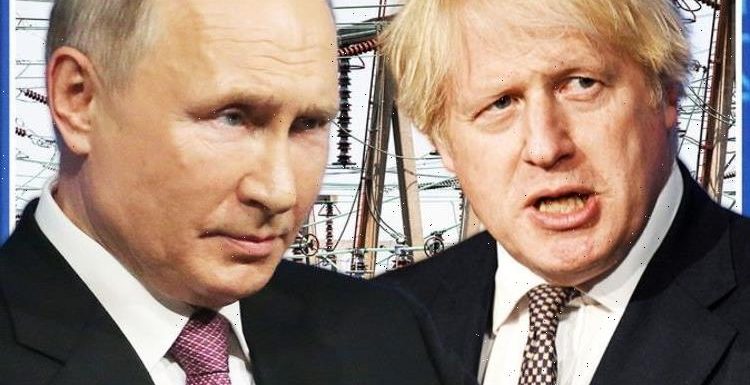
Russia: Putin could start ‘nuclear armageddon’ says Ostalski
We use your sign-up to provide content in ways you’ve consented to and to improve our understanding of you. This may include adverts from us and 3rd parties based on our understanding. You can unsubscribe at any time. More info
As Russia continues to mount pressure on Ukraine with its build-up of a 100,000 strong army of troops stationed at the Ukraine-Russia border, the West has gone into crisis mode. As Ukraine is a key transit route for Russia’s gas to reach Europe (a third of Europe’s gas comes from Russia), analysts warned that an outbreak of conflict could further slash Europe’s supplies.
And now, Russia has sent an actual threat to cut Europe’s gas if Britain and the US ban it from SWIFT, a global payments system.
With fears soaring, the UK Business Department has moved to get a greater electricity supply than previously planned on standby for next winter.
Already, Russia has been sending global energy prices soaring by slashing deliveries to Europe through its vast network of pipelines.
City analysts have now warned that gas prices in Britain could more than quadruple by £10 per therm.


They added that this could spark rolling blackouts if Russia did pull the trigger and cut more of Europe’s gas.
While Britain does not directly purchase pipeline gas from Russia, it does import some via the Netherlands and Belgium.
And gas supplies also have a knock-on effect on the cost of electricity prices.
That is because the energy source is used to generate over a third of the power in the UK.
Ministers are also worried because closures and outages at nuclear have put added strain on Britain’s energy grid.
And, the shutdown of large coal and gas-fired power stations as the Government races to net zero have not helped with energy security either.

As an emergency measure, selected generators are paid to make sure they are on standby in case of electricity shortfalls every year.
Amid the soaring Russia tension, the Government has opted to set a new target of procuring 5.4 gigawatts of capacity for this market in 2022-2023.
This surpasses the target of 4.7 gigawatts recommended by National Grid ESO, the body tasked with balancing electricity supply and demand.
Business Secretary, Kwasi Kwarteng, told Fintan Slye, director of National Grid ESO, in a letter: “While I agree with the analysis you provided in fulfilment of your remit under the Capacity Market Regulations, this target reflects the broader uncertainties within the power sector.”
And while the US appears to be helping Europe prepare for the event of gas shortages, some analysts have tipped that this may not be enough.
DON’T MISS
NASA offering $1m to come up with ‘innovative’ solution to dilemma [REPORT]
UK scrambles to bolsters gas supplies as Russia threatens blackouts [REVEAL]
World holds breath as Ukraine to fire rocket amid Russia tension [INSIGHT]

US President Joe Biden has urged companies across the world to ramp up liquified natural gas (LNG) production.
This would help to decrease reliance on Russia’s pipeline gas and instead boost supplies coming in from Asia, the Middle East, the US and elsewhere.
But analysts at US investment bank Stifel said that there would not be enough gas available on the global market in liquified natural gas to make up for the shortfall.
Analysts Chris Wheaton and David Round, said: “It’s not pretty. Energy rationing would be inevitable in this scenario, which would be disastrous for the European economy.
“Could we see quadruple-digit UK gas prices – over 1000p/therm in this event? Yes, we could, in our view.

“Demand for power would need to be reduced. This would require industry shut-ins, power rationing through rolling blackouts, to both reduce average demand and also shift and flatten power demand peaks.”
A government spokesman said: “Energy security is an absolute priority for the Government, and we take no chances with security of supply.
“The Capacity Market acts as an effective insurance mechanism, providing secure and affordable electricity that families and businesses can rely on.
“In setting the auction targets we consider a range of factors including the possibility that some sources of generation may not be available at the time of the delivery year. Through the Capacity Market, we have secured the electricity Britain needs to cope with peaks in demand out to 2024/25.”
Source: Read Full Article